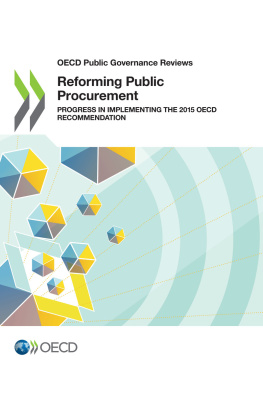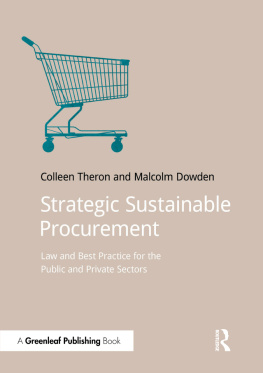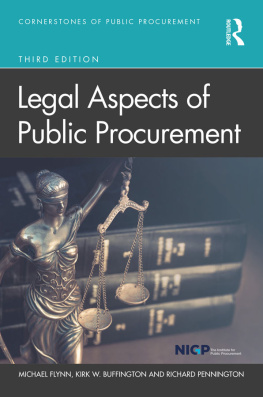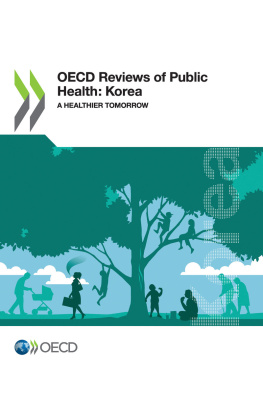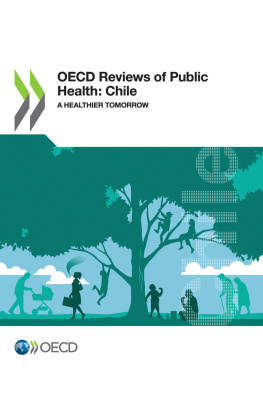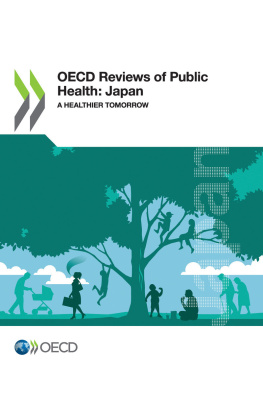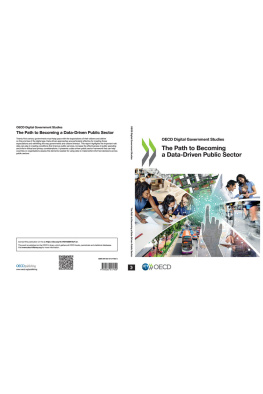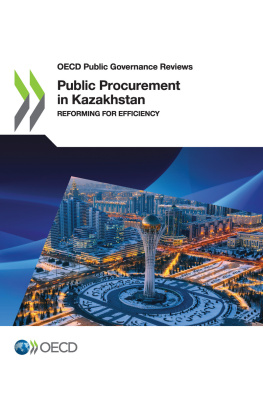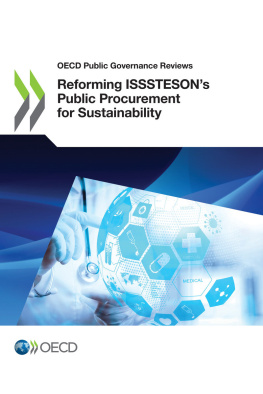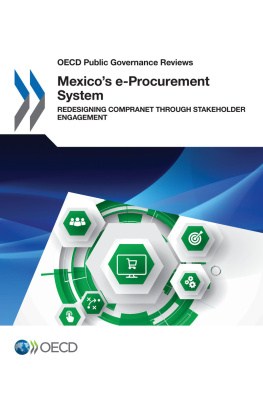OECD - Reforming Public Procurement
Here you can read online OECD - Reforming Public Procurement full text of the book (entire story) in english for free. Download pdf and epub, get meaning, cover and reviews about this ebook. year: 2019, publisher: OECD Publishing, genre: Politics. Description of the work, (preface) as well as reviews are available. Best literature library LitArk.com created for fans of good reading and offers a wide selection of genres:
Romance novel
Science fiction
Adventure
Detective
Science
History
Home and family
Prose
Art
Politics
Computer
Non-fiction
Religion
Business
Children
Humor
Choose a favorite category and find really read worthwhile books. Enjoy immersion in the world of imagination, feel the emotions of the characters or learn something new for yourself, make an fascinating discovery.
Reforming Public Procurement: summary, description and annotation
We offer to read an annotation, description, summary or preface (depends on what the author of the book "Reforming Public Procurement" wrote himself). If you haven't found the necessary information about the book — write in the comments, we will try to find it.
OECD: author's other books
Who wrote Reforming Public Procurement? Find out the surname, the name of the author of the book and a list of all author's works by series.
Reforming Public Procurement — read online for free the complete book (whole text) full work
Below is the text of the book, divided by pages. System saving the place of the last page read, allows you to conveniently read the book "Reforming Public Procurement" online for free, without having to search again every time where you left off. Put a bookmark, and you can go to the page where you finished reading at any time.
Font size:
Interval:
Bookmark:
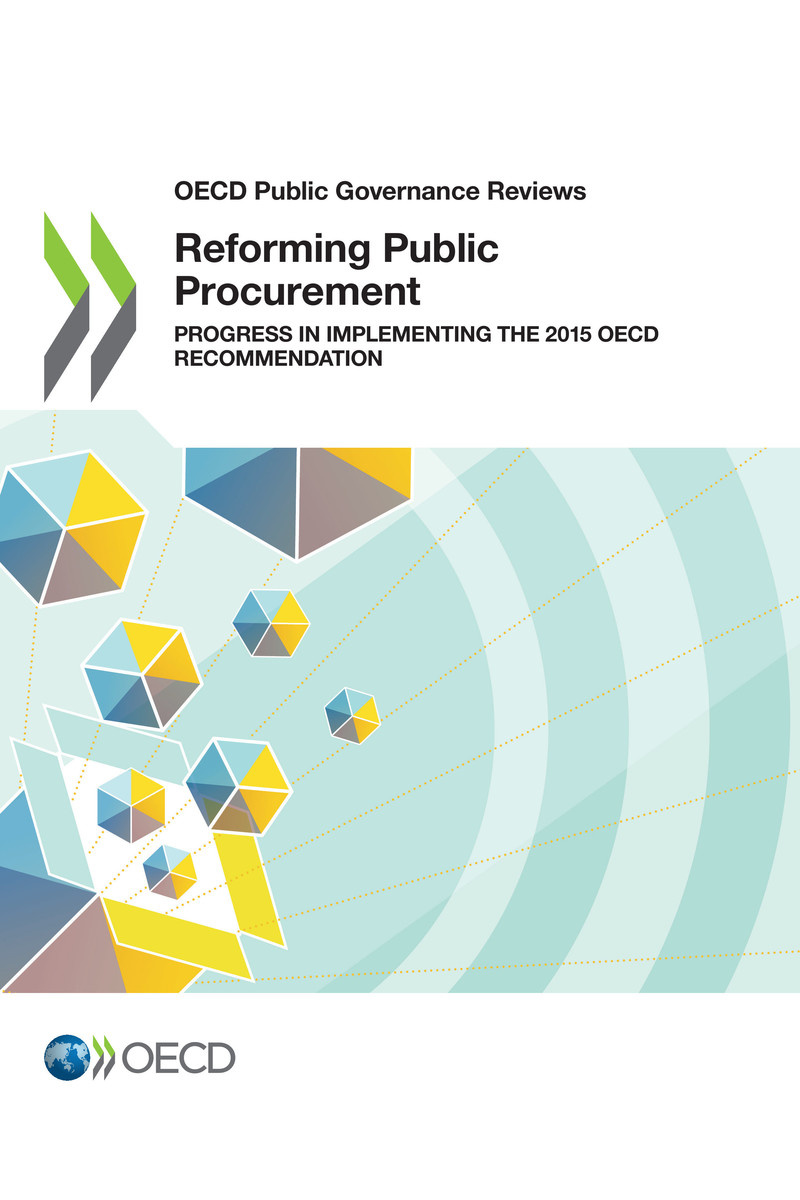
OECD (2019), Reforming Public Procurement: Progress in Implementing the 2015 OECD Recommendation , OECD Public Governance Reviews, OECD Publishing, Paris, https://doi.org/10.1787/1de41738-en .
Public procurement is a crucial pillar of service delivery for governments, affecting citizens lives in areas ranging from energy efficiency to health services. Because of the sheer volume of spending it represents, well-governed public procurement plays a major role in fostering public sector efficiency and establishing citizens trust. Governments are also increasingly using public procurement as a strategic tool for achieving policy goals such as environmental protection, innovation, job creation and the development of small and medium enterprises.
The 2015 OECD Recommendation of the Council on Public Procurement is the overarching OECD guiding framework that promotes the strategic and holistic use of public procurement. It is a reference for modernising procurement systems and can be applied across all levels of government and state-owned enterprises. It addresses the entire procurement cycle while integrating public procurement with other elements of strategic governance such as budgeting, financial management and additional forms of services delivery. The Recommendation was developed by the Working Party of the Leading Practitioners on Public Procurement (LPP) under the purview of the Public Governance Committee (PGC) and adopted by the OECD Council in February 2015 [ OECD/LEGAL/0411 ]. It has been a source of inspiration for a number of other international standards, such as the Methodology for Assessing Procurement System (MAPS), the European Recommendation 2017/1805 on the professionalisation of public procurement, the Compendium of Good Practices on the Use of Open Data for Anti-corruption Across G20 Countries, and the G20 Principles for Promoting Integrity in Public Procurement.
In 2018, the OECD carried out a survey on the Implementation of the Recommendation in 34 countries, spanning a range of topics relevant to the 12 integrated principles of the Recommendation. Based on the survey results, this report presents progress made across OECD members and non-members in implementing reforms of their procurement systems. It highlights public procurements decisive impact on the delivery of better, smarter and more innovative public services. The report also sheds light on the contribution of public procurement reforms to crosscutting initiatives such as digital transformation or public workforce development. Annexed to the report is a recent study by the Inter-American Development Bank on procurement systems in LAC countries, illustrating how the Recommendation has been used to guide and shape the transformation of countries public procurement systems but also to build regional convergence in this policy area. While much progress has been made in reforming procurement systems worldwide, challenges remain, in particular the professionalization of the workforce to ensure it is capable of using public procurement to promote innovation, sustainability and growth.
This report demonstrates that the Recommendation has made a significant impact in the public policy arena. The OECD will continue to provide evidence to support countries in developing better procurement policies for better lives.
This document was approved by the OECD Working Party of the Leading Practitioners on Public Procurement (LPP) on 1 April 2019.
This document [ GOV/PGC(2019)13/REV1 ] was approved by the Public Governance Committee on 7 June 2019 and adopted by the Council on 16 July 2019 [ C(2019)94/FINAL ] and prepared for publication by the OECD Secretariat.
Under the direction and leadership of Marcos Bonturi, Director of OECDs Public Governance Directorate and the guidance of Jnos Bertk, Head of the Public Sector Integrity Division, this report was co-ordinated by Paulo Magina, Head of the Public Procurement Unit and Fleur DSouza, Senior Analyst on secondment from the Ministry of Business, Innovation and Employment, New Zealand. Matthieu Cahen, Deputy Head of Public Procurement Unit, provided guidance and reviewed the report. Antoine Comps, Policy Analyst, contributed to the report, authoring a section, working on the survey responses and formulating data inputs. Preliminary work on building the evidence base was carried out by Minjoo Son, Policy Analyst. Inputs were also provided by Lena Diesing, Angelos Binis, Masayuki Omote, Tessa Cullen, Gavin Ugale, Felicitas Neuhaus from the Public Sector Integrity Division and Cline Folsch and Lawrence Pacewicz from the Legal Directorate. The report also benefited from valuable comments from Barbara Ubaldi, Head of the Digital and Open Data Team, Reform of the Public Sector Division.
Special thanks go to the delegates and senior public officials participating in the OECD Working Party of Leading Practitioners on Public Procurement, the Working Group on Bribery in International Business Transactions and the Competition Committee, directly involved in this exercise, as prescribed in the Recommendation. The report benefited from a wide consultation across the OECD. It was prepared in consultation with the Environment Policy Committee (EPOC), the Economic Policy Committee (EPC), the Committee for Scientific and Technological Policy, the Working Party of National Experts on Science and Technology Indicators, the Committee on Digital Economy Policy (CDEP), the Working Party of Senior Public Integrity Officials (SPIO), the Working Party of Senior Budget Officials (SBO), the Working Party on Public Employment and Management (PEM) and the Working Party on SMEs and Entrepreneurship (SMEE).
The report integrates data and evidence collected through the Survey on Public Procurement conducted in 2016 on three main areas: policies to pursue secondary policy objectives, e-procurement and central purchasing bodies. In August 2018, a second questionnaire assessed progress on the implementation of the Recommendation against its twelve principles. The data collection phase took place from August to December 2018. The questionnaire received responses from 31 Adherents (Australia, Austria, Belgium, Canada, Chile, Denmark, Estonia, Finland, France, Germany, Greece, Hungary, Iceland, Ireland, Israel, Italy, Japan, Korea, Latvia, Lithuania, Mexico, Netherlands, New Zealand Norway, Poland, Portugal, Slovak Republic, Slovenia, Spain, Sweden, Turkey), and three non-Members non-Adherents (Costa Rica, Morocco and Peru). It also benefited from a regional assessment on the implementation of the Recommendation in LAC countries, conducted in 2017/2018 by the Inter-American Development Bank in 16 countries from the region.
Font size:
Interval:
Bookmark:
Similar books «Reforming Public Procurement»
Look at similar books to Reforming Public Procurement. We have selected literature similar in name and meaning in the hope of providing readers with more options to find new, interesting, not yet read works.
Discussion, reviews of the book Reforming Public Procurement and just readers' own opinions. Leave your comments, write what you think about the work, its meaning or the main characters. Specify what exactly you liked and what you didn't like, and why you think so.

